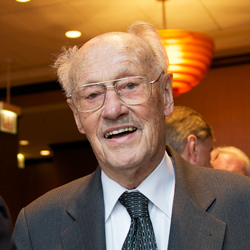McCormick Prof. Wolfgang Sachtler dies after more than 30 years at Northwestern

Source: McCormick School of Engineering
Wolfgang Sachtler
January 15, 2017
Engineering and chemistry Prof. emeritus Wolfgang Sachtler died earlier this month, according to a news release from the McCormick School of Engineering.
Sachtler, 92, joined Northwestern’s faculty in 1983 and was known for his groundbreaking research in heterogeneous catalysis, a vital component to pollution control and the production of fuel and chemistry.
A pioneer in the field, Sachtler served as vice president of the International Congress on Catalysis and on the editorial boards of several publications specializing on catalysis. He died on Jan. 8.
Chemical and biological engineering Prof. Randall Snurr — who had worked with Sachtler as a member of the Institute for Catalysis in Energy Processes, which partners closely with NU’s Center for Catalysis and Surface Science — described Sachtler as having an “encyclopedic knowledge” about chemistry and catalysis.
“There’s a very long history of catalysis research here at Northwestern, and he’s been a big part of that,” Snurr said. “It’s still very much a strength of Northwestern, so he’s been a major figure in that area here at the university.”
Born in pre-war Germany, Sachtler received a Ph.D. from the University of Braunschweig in 1952 when research in catalysis was still a budding field. Sachtler is among the first scientists credited in establishing the field.
Sachtler continued to research catalysis at the University of Leiden and Shell Research Laboratories in Amsterdam, where he was promoted to director of fundamental research. There, he led a team that used catalysis to improve oil efficiency.
Chemistry Prof. SonBinh Nguyen, who first joined Northwestern as an assistant professor in 1996, said he was initially struck by Sachtler’s kindness. As one of the first faculty members Nguyen met, Sachtler welcomed him despite their gap in age and experience, he said.
“He was very kind to me and afterward, I found out that I’m not the only one,” Nguyen said. “He’s uniformly kind to all the young people … and is really cheerful in talking to them and trying to encourage them to do good science and really cares about the next generation.”
Nguyen said Sachtler’s kindness extended beyond the University.
Sachtler was married to Anne-Lore Sachtler and the father of three children. He also had five grandchildren and two great-grandchildren.
“He and his wife Anna-Lore are really one of the nicest couples that I have met,” Nguyen said. “All the students and post-doc fellows that have worked with them — they really treat them like they’re family.”
Nguyen remembers the Sachtlers’ constant willingness to spend time with people and invite them into their home with open arms. People were always welcome to celebrate holidays or eat dinner with them when they had nowhere else to go, he said.
In addition to being kind and generous, Sachtler was also very hard-working and devoted to his work, said chemical and biological engineering Prof. Harold Kung.
“He’s a very high-level scientist,” Kung said. “He knows the field of catalysis very well … (and) is very demanding from that point of view. He asks his students, postdocs and professors very probing questions that always go back to the fundamentals.”
At Northwestern, Sachtler served as the third Vladimir Ipatieff Professor of Chemistry and continued his research on catalysis, focusing on zeolite-based catalysis. He directed much of his work toward developing more sustainable energy solutions and methods for cleaning the environment.
“We at Northwestern have a lot of giants in chemistry,” Nguyen said. “He made major progress … and so he’s just really a role model to all of us. And we lost a giant in the field.”
Email: matthewchoi2018@u.northwestern.edu
Twitter: @matthewchoi2018
Email: yvonnekim2019@u.northwestern.edu
Twitter: @yvonneekimm


